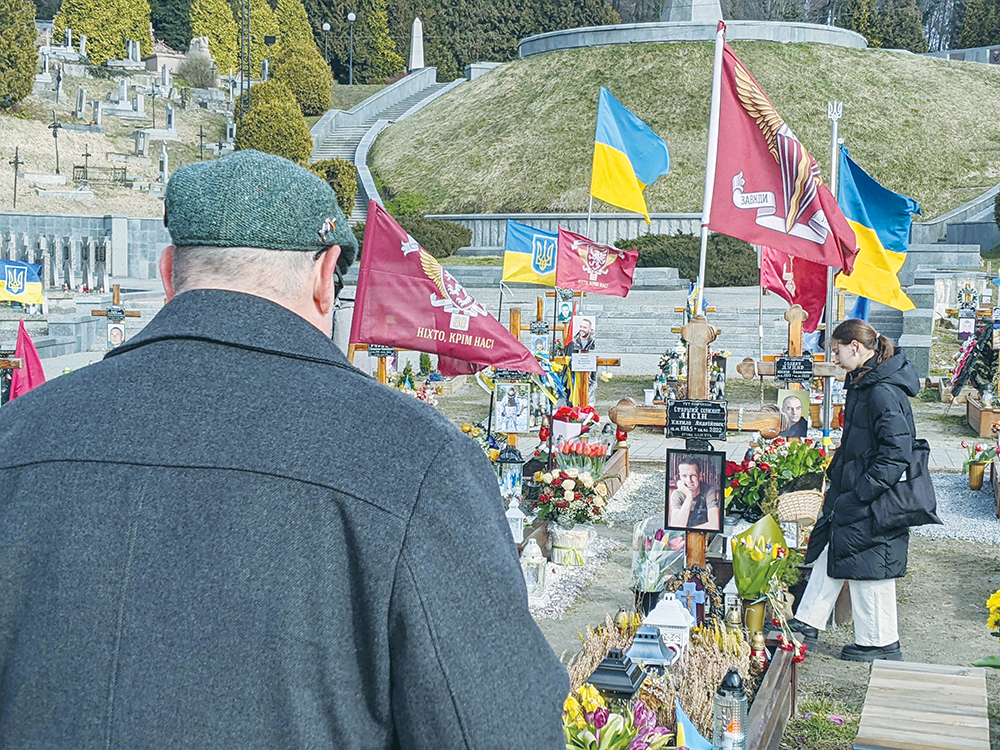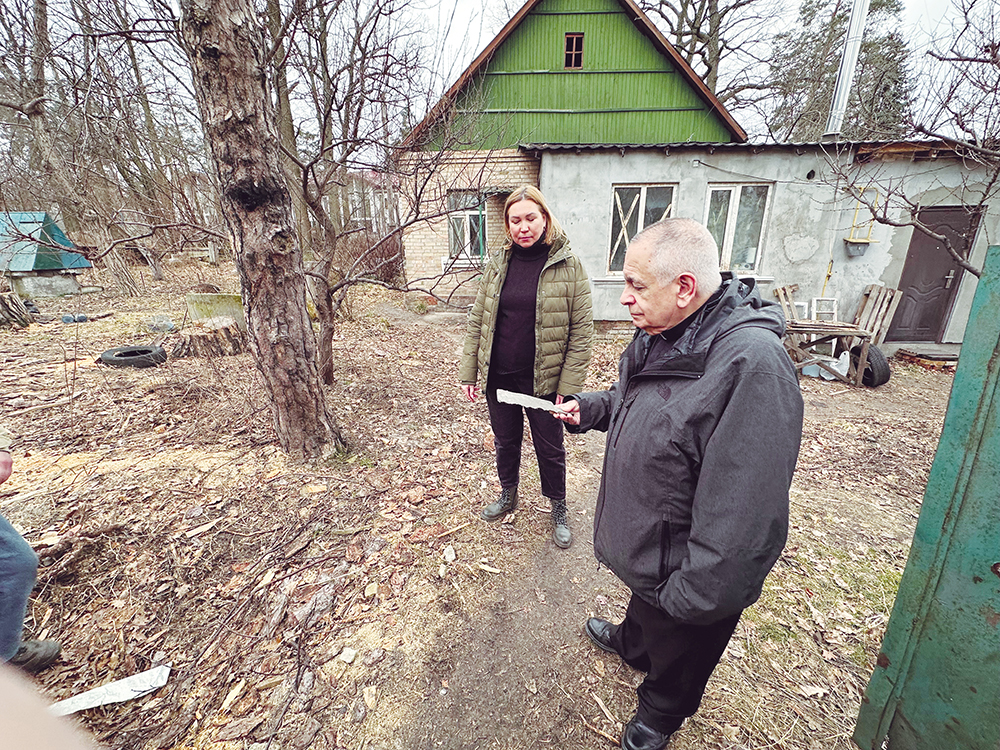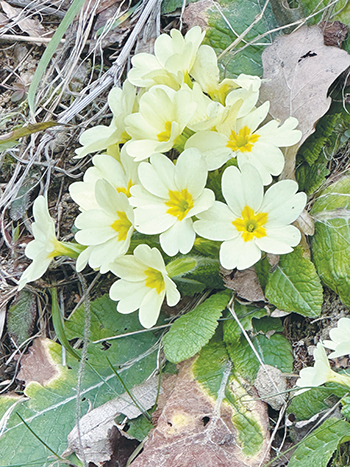Senior Director, Global Health, Catholic Health Association
 Illustration by Roy Scott
Illustration by Roy ScottAs the world watched events unfold during Russia's 2022 invasion of Ukraine, many CHA members inquired about the most effective ways to provide humanitarian support. CHA hosted multiple networking events to share best practices and hear and connect with
members and those already on the ground working in Ukraine and surrounding countries.
Among those connections was Monsignor Robert Vitillo, Secretary General of the International Catholic Migration Commission, with whom CHA has a longstanding relationship. We learned the commission had been tasked with convening Catholic Response for Ukraine,
a working group assembled at the prompting of the Vatican's Dicastery for Promoting Integral Human Development, to cultivate dialogue among the first-line actors and provide insights to Catholic organizations around the globe.1
CHA and our members worked closely with Catholic Response for Ukraine, connecting and contributing to projects. As a result, CHA was invited to become part of the working group and subsequently, invited to join a solidarity trip to Poland and Ukraine
in March. I joined Monsignor Vitillo and his Catholic Response for Ukraine colleague, Christian Kostko, in visiting several projects throughout Ukraine to see firsthand the depth of the Catholic Church's impact.
❖ ❖
The trip was one of my most life-changing experiences. As I continue to process what I experienced, I offer this reflection and invite you to consider your efforts and how best to continue to support our brothers and sisters in Ukraine.
 Photo by Christian Kostko
Photo by Christian Kostko
CHA's Senior Director of Global Health Bruce Compton, foreground, visits a cemetery in Lviv where loved ones leave flowers and pictures at soldiers' graves in early March 2023. Compton was among representatives visiting
Ukraine and Poland to learn more about the Church's aid efforts in the region since a major escalation by Russia about a year prior. The woman in the photo has not been identified.The Human Toll of War: Lives Forever Changed by the Conflict in Ukraine
On our first full day in Ukraine, we visited a cemetery where the graves of soldiers from Lviv, a city far from the front lines, were much too plentiful. Watching
families and friends grieve at the graves of their loved ones set a tone for the trip. What I saw that day will forever be etched in my mind as a stark reminder of the death and destruction being caused by this unjust war.
Several days later, we visited a small town 10 miles outside of the city of Kyiv, where a woman named Olga Shatylo shared the pain and trauma she and her family have experienced since the start of the war. We walked with her as she showed us the house
and surrounding area where she stayed for two weeks in the early days of the invasion. She told us where the Russians were located, just one block away, and where the Ukrainian soldiers were, one block in the opposite direction. While she and several
others holed up in a house directly between the two, the soldiers and tanks fired at each other in the streets. She showed us the craters in the ground where shells had hit just yards from the house. Each day, she said, when they would go out to get
water, Russian snipers would shoot at them. They were innocent civilians caught in the middle of a firefight. She was bold, and it seemed as if it was therapeutic for her to tell us the story. Olga took us around the neighborhood, and it was nearly
impossible to find a surface without bullet holes or demolished by bombings.
As we continued, Olga took us to see another family whose property had been destroyed. There, the matriarch of the family told us her husband's family had lived there for four generations and that all three houses on the small site were destroyed. As
a result of the war, their family is now scattered throughout the world — in neighboring countries, as well as in South and North America. The matriarch and her husband were living in a neighbor's home nearby, allowing them to try and rebuild
so that their family could one day be reunited. She told us the rebuilding went slowly due to the war and a lack of resources, but that they were committed to the long journey. Her final messages were "thank you" and "please tell the world what they
have done to us!"
 Credit: Photo by Bruce Compton
Credit: Photo by Bruce Compton
Monsignor Robert Vitillo, right, secretary general of the International Catholic Migration Commission, listens as Ukrainian Olga Shatylo points out a crater from shelling near Bucha in north central Ukraine.
She said she and others holed up in the house in the background for about two weeks, as Russians and Ukrainians fought with guns and heavy artillery in the streets just outside.❖ ❖
I ask for God's blessing on Olga, her family, friends, neighbors and all who have suffered devastating losses. May they one day be reunited with their loved ones, just as I was with mine upon returning home from my short visit to Ukraine. May we never forget their stories as we tell the world what this war has done to them.
Learning From Ukrainian Hospitals: The Importance of Supporting Skilled Medical Professionals
On our trip, we had the opportunity to visit a Catholic hospital as well as a state one. We heard repeatedly throughout the visits that
their medical professionals need our continued support, but not our junk. As we visited with the head of orthopedics at the state hospital, I asked how we might be of help. He responded by saying that they could likely teach us about trauma care,
and he led us to his office where his computer monitor was filled with live video of their skilled surgeons and nurses caring for patients at the hospital. From his office, he was monitoring six of their surgical suites and multiple recovery rooms.
This encounter reminded me of our guiding principles for global health activity: patience, prudence, humility, excellence, authenticity and honesty.
❖ ❖
I pray for those who are injured or traumatized and being cared for by the amazing health care professionals of Ukraine, for the professionals themselves and their well-being, and for all who hope to help moving forward. The lessons I learned are a reminder of why our guiding principles are important in fulfilling the mission of Catholic health care.
Witnessing the Work of the Church in Ukraine: Serving Neighbors and Supporting Veterans
As the trip continued, we had many opportunities to witness Ukrainian lay people, priests and religious sisters working diligently and with great
passion to help meet their neighbors' needs. In a rural village, we visited a parish that operated a day care for children with disabilities, a farm and several other ministries. In another town, we visited a diocesan House of Mercy that cared for
children, families, men and women, most of them internally displaced due to the war.
In that same community, we visited a diocesan-supported foster home with 10 children run by a religious sister who cared for them in a "family-like" environment. Later that day, in another city, we visited a priest with the Ukrainian Greek Catholic Church
and his wife, a psychologist. The couple used puppet therapy with internally displaced persons traumatized by the war's effects.
❖ ❖
I pray in gratitude for the infrastructure, talent, education, formation and community that enables the Church to accompany and care for those experiencing the devastating impacts of this war. I give thanks to God for the opportunity to travel safely throughout Ukraine to see the amazing work of the Church.
As we continued our journey, we saw a military museum in the basement of a parish in Khmelnytskyi in western Ukraine, where soldiers are invited to bring items from the front lines and leave them for visitors to see. The team operating the parish-based
museum included a priest, psychologist, social worker, lay people and a military chaplain who regularly visit with soldiers both at the parish and on the front lines. They talk with soldiers about the items they bring as a way to open discussions
on their experiences as they work toward healing. The team explained when soldiers relay the stories of their "items from the front," they also leave behind some of the trauma from the experience.
On our final full day in Ukraine, we observed a retreat for returned veterans and their spouses put on by the Knights of Columbus. We were told these retreats came about because of a conversation between a member of the Knights of Columbus, who is also
a psychologist and professor from a nearby university, and a priest who helped start the Knights of Columbus in Ukraine. The psychologist discussed statistics regarding the toll of the Vietnam War on returned U.S. military. They concluded that they
had to do something to help prevent suicides, homelessness and broken families among returned Ukrainian veterans. We witnessed one result of that conversation, a retreat for returned veterans and their spouses traumatized by war. This took place in
a beautiful resort nestled in the mountains in rural Ukraine.
 Photo by Bruce Compton
Photo by Bruce Compton
Compton spotted these wildflowers when leaving a retreat planned by the Knights of Columbus for veterans and their spouses. On the tail end of an event seeking to bring people some solace, the flowers reminded him
that during the inhumanity of war, people could still engage in beautiful acts of humanity toward one another.❖ ❖
I pray for peace, and for the well-being and support of the soldiers, social workers and all our brothers and sisters who are readjusting and dealing with the traumas and effects of war.
As our time at the retreat came to an end on that final day of our trip, I told Monsignor Vitillo and Christian that I would walk down the hill and wait for them. As I walked, contemplating all that I had experienced, I passed a beautiful stream rushing
down the mountainside. Along my path, I saw a wildflower growing. I stopped to take a picture and noticed it had emerged through dormant grass and was surrounded by dead leaves. On that cold mountainside, where conditions didn't yet seem appropriate,
was this beautiful flower.
The analogy of that flower to all we had experienced was a fitting close to the trip. We saw the remnants of war and the ongoing activities surrounding it contrasted with the beauty and humanity of the Ukrainians who responded so generously in helping
their neighbors. It was so evident and beautiful at every stop along the way, and yet, horrifying that it was necessary. There were so many more contrasts — I only wish I had space to share them all. However, the final contrast — the way
our actions can help or harm one another — has already left a mark on my life, and it is one that I will continue to grapple with.
❖ ❖
I went to Ukraine not knowing what I would see or how it would affect me personally. I left feeling blessed to have had the opportunity to see the Church in action at various projects throughout the country and very fortunate to work with and for a church that truly cares.
BRUCE COMPTON is senior director, global health, for the Catholic Health Association, St. Louis.
NOTE
- Catholic Response for Ukraine (CR4U), https://www.cr4u.info.